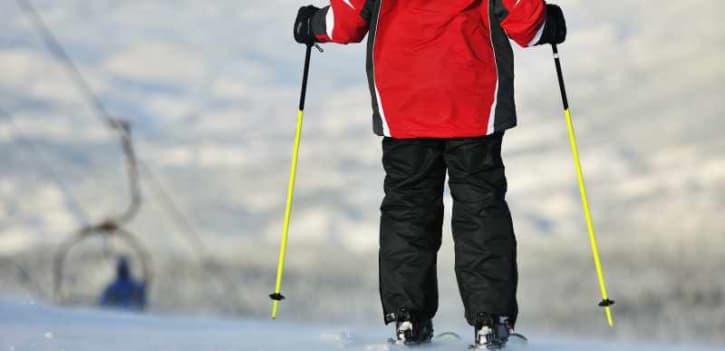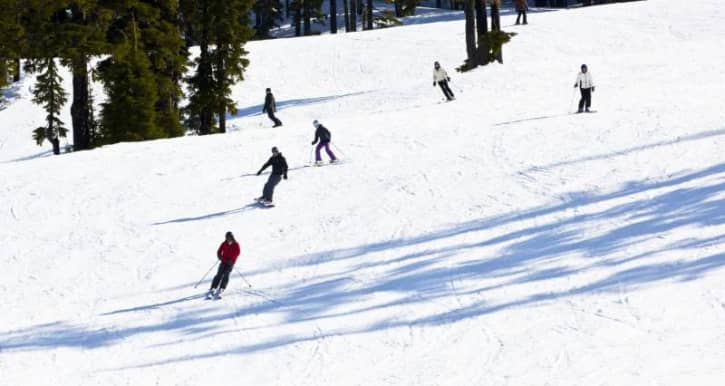While you're probably having too much fun to notice, skiing and snowboarding are actually intense exercises. And just like any other form of exercise, it's important to stay hydrated. You're most likely sweating under all your gear without noticing, and trails don't exactly have access to running water.

Here are the best ways to do it - and some gear ideas that can help:
Contents
Ways to Stay Hydrated
1. Skip the Alcohol
Alcohol is prevalent and ski resorts and many people even drink on the lifts (bad idea). But immediate safety aside, dehydration is a major reason why alcohol should be avoided.
Unlike coffee (which we'll get to next) alcohol actually leaves you at a liquid negative. According to ABC Science, drinking 200 ml of alcohol actually causes you to lose 320 ml of water. That equates to 120 ml more liquid than you've consumed.
Alcohol causes dehydration in other ways. Many people say that alcohol makes you "warm," but it's really bringing the blood from your core to the surface of your skin. This can cause you to sweat unnecessarily, especially under all of your layers. In addition to all the other problems, this is also going to cause you to become more dehydrated.
2. Don’t Sweat the Coffee (but still drink water)
The information on coffee consumption and dehydration is a bit mixed. But according to the latest research, it appears that it doesn't increase your risk of dehydration. While it is still a mild diuretic, coffee doesn't cause you to lose more fluid than you take in by drinking it. The result is a hydration positive rather than a negative. The same goes for tea.
But that doesn't mean that you should only drink coffee. Be sure to drink plenty of water as well. If you're doing a physical activity like skiing or boarding, chugging down cups of Joe probably isn't going to be enough to sustain you.
3. Fully Hydrate in the Morning
It's quite common to wake up dehydrated in the morning--especially if you've been drinking the night before. But if you want to stay hydrated when you're out skiing, you should drink more than if you're going to the office. You can do a hydration test strip if you want to get really accurate, but I consume it by how I feel.
The total amount water varies for everyone, but don't drink so much that you're going to need a break after your first run.
4. Don’t Overdress
You obviously don't want to be too cold on the slopes, but you don't want to be too hot either. Being too hot will cause you to sweat excessively and, you guessed it, get more dehydrated.
Here are a few different tips to make your gear a bit cooler:
- Switch from a winterized base layer to a lighter one.
- Use a 3-in-1 jacket so that you can actively strip layers.
- Get equipment that has vents that you can close or open depending on how you feel.
- Put your balaclava below your chin.
Before you leave for the mountain, check the temperature and dress accordingly.
5. Carry a Hydration Pack
Hydration packs are basically backpacks that have the ability to store a "bladder". They're typically pretty small, and some are even designed to carry other gear such as your skis. Simply put, the bladder attaches to a hose that attaches to your mouth. At any point, you can take a sip of water from your backpack.
It is important to note that there is one major consideration you should make for winter sports: insulation. When the temperature drops really low, the water in the bladder and hose have the potential for freezing, making it difficult or impossible to drink.
Why It’s Important
Staying hydrated is important for both your safety and your performance. Water serves multiple functions in the body that relate to athletics, including:
- Joint lubrication
- Body temperature regulation
- Nutrient transport
Not properly hydrating for physical activity (or otherwise) can lead to muscle cramps and/or dizziness--two feelings you don't want when you're whizzing down a mountain.
Taking time and money into account, you don't want to have to end your day prematurely or not tackle the trails you set out to do. Proper hydration will help you in both of these areas.
Wrapping Up
Now that you've read our tips for being hydrated, go do it! We think it will help you get the most out of your next ski trip.
If you have any additional tricks that we missed, please leave them in the comments below!






